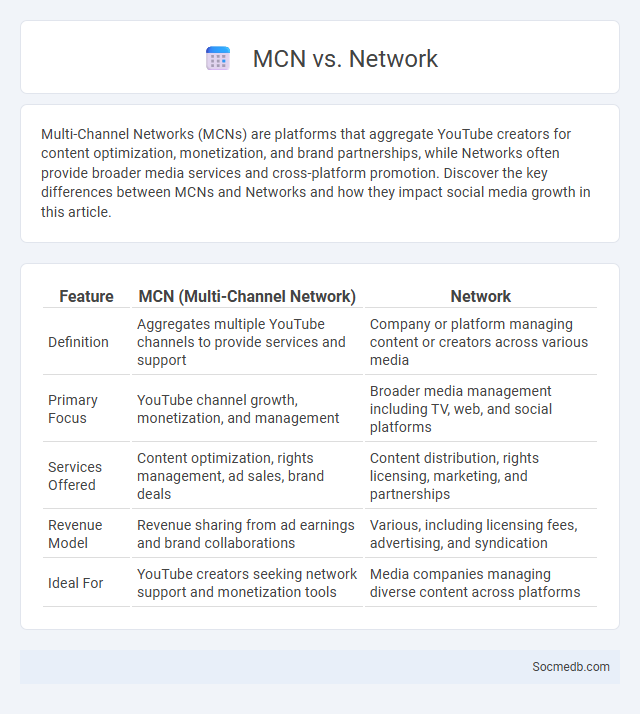
Photo illustration: MCN vs Network
Multi-Channel Networks (MCNs) are platforms that aggregate YouTube creators for content optimization, monetization, and brand partnerships, while Networks often provide broader media services and cross-platform promotion. Discover the key differences between MCNs and Networks and how they impact social media growth in this article.
Table of Comparison
| Feature | MCN (Multi-Channel Network) | Network |
|---|---|---|
| Definition | Aggregates multiple YouTube channels to provide services and support | Company or platform managing content or creators across various media |
| Primary Focus | YouTube channel growth, monetization, and management | Broader media management including TV, web, and social platforms |
| Services Offered | Content optimization, rights management, ad sales, brand deals | Content distribution, rights licensing, marketing, and partnerships |
| Revenue Model | Revenue sharing from ad earnings and brand collaborations | Various, including licensing fees, advertising, and syndication |
| Ideal For | YouTube creators seeking network support and monetization tools | Media companies managing diverse content across platforms |
Introduction to MCNs and Networks
Multi-Channel Networks (MCNs) are organizations that collaborate with content creators on platforms like YouTube to optimize growth, monetize videos, and manage copyright issues. These networks provide You with resources such as audience development, brand partnerships, and production support to amplify your social media presence. MCNs leverage analytics and advertising partnerships to boost network-wide content performance and revenue.
Defining Multi-Channel Networks (MCN)
Multi-Channel Networks (MCNs) are organizations that partner with multiple YouTube creators to provide services such as audience development, content programming, and monetization support. These networks help creators optimize their social media presence by leveraging analytics, brand partnerships, and distribution strategies to increase reach and revenue. MCNs play a crucial role in managing and scaling digital content across various platforms, enhancing creator visibility and engagement.
What is a Network in the Digital Content Space?
A network in the digital content space refers to an interconnected system of platforms, users, and content creators facilitating the creation, sharing, and distribution of information. These networks leverage algorithms and user data to optimize content visibility and engagement across social media channels like Facebook, Instagram, and Twitter. Understanding digital networks is essential for maximizing reach, targeting audiences, and driving effective content marketing strategies.
MCN vs Traditional Network: Core Differences
Multi-Channel Networks (MCNs) differ from traditional networks by offering creators specialized digital support, including audience development, monetization strategies, and content optimization across platforms like YouTube and TikTok. Unlike traditional networks that typically focus on TV and radio distribution, MCNs leverage data analytics and influencer partnerships to maximize online visibility and engagement. The core advantage of MCNs lies in their ability to provide tailored marketing and brand collaboration opportunities, driving higher revenue streams for digital content creators.
Benefits of Joining an MCN
Joining a Multi-Channel Network (MCN) can significantly boost your social media growth by providing access to exclusive monetization opportunities, brand partnerships, and expert content strategies. MCNs offer valuable analytics and audience insights that help tailor your content for higher engagement and reach. Leveraging these networks increases your chances of turning social media presence into a sustainable revenue stream.
Advantages and Disadvantages of Networks
Social media networks offer significant advantages such as enhanced communication, real-time information sharing, and opportunities for business marketing and brand building. However, they also present disadvantages including privacy concerns, misinformation spread, and the potential for addiction or negative mental health impacts. Balancing these benefits and risks is crucial for maximizing the positive influence of social media platforms.
MCN vs Network: Revenue Models Compared
MCNs (Multi-Channel Networks) primarily generate revenue through ad revenue sharing, brand partnerships, and content licensing, leveraging creator audiences to negotiate better deals with platforms like YouTube. Networks often rely on subscription fees, affiliate marketing, and direct sponsorships to diversify income streams beyond standard ad revenue. MCNs benefit from scalable digital ad placements, while networks focus on cultivating long-term partnerships and exclusive content monetization strategies.
Control, Support, and Creative Freedom
Social media platforms provide users with control over their content visibility and audience engagement settings, ensuring personalized experiences. Robust support systems, including community guidelines and user assistance, help maintain safe and productive environments. Creative freedom is fostered through diverse tools and features, enabling users to express unique ideas and build authentic connections.
Choosing Between MCN and Network: Key Considerations
Choosing between an MCN (Multi-Channel Network) and a traditional network impacts Your social media growth, revenue opportunities, and content control. An MCN offers enhanced technical support and cross-promotion but may require revenue sharing, while a traditional network often provides stronger brand partnerships with less operational involvement. Assess Your content goals, preferred level of independence, and monetization strategies to determine the most effective network type for maximizing social media influence.
Future Trends: MCN and Network Evolution
Future trends in social media emphasize the growth of Multi-Channel Networks (MCNs) and their role in content creator support, monetization, and audience engagement. Network evolution is driving enhanced analytics, AI-powered personalization, and cross-platform integration to optimize user experiences and marketing strategies. Your ability to leverage these advancements will determine success in navigating the rapidly changing social media landscape.
 socmedb.com
socmedb.com